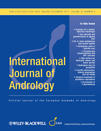Incidence of sperm-associated immunoglobulins in infertile men with suspected autoimmunity to sperm
Abstract
Semen samples from 120 infertile men with suspected autoimmunity to sperm were investigated by a direct immunobead test (IBT). Fifty-three (44%) of them had 10% or more motile sperm coated with anti-IgG and/or anti-IgA immunobeads. Both classes of immunoglobulins were found to be present in 88.7% of the antibody positive ejaculates. These sperm-bound Igs were associated with sperm autoagglutination in 80% of the ejaculates and with decreased sperm penetration into cervical mucus in 97.6% of the cases. The close correlation found between the IBT results and the occurrence of antisperm antibodies in serum and in seminal plasma suggests that sperm-bound Ig's are sperm-specific antibodies. It is concluded that the direct IBT is not only a reliable screening test for sperm antibodies but is also a relevant test to determine whether these antibodies exert an influence on male fertility.




